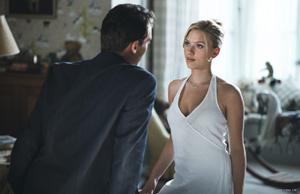Match PointRating: * * * * *Type: Drama/RomanceLength: 124 minutesMPAA Rating: RCast: Jonathan Rhys-Meyers, Scarlett Johansson, Matthew Goode, Emily MortimerDirector: Woody AllenPlaying at: Brier Creek, Colony, Crossroads
To the nouveau fan of Woody Allen, he is the nervous and quirky film maker and actor whose controversial personal life outweighs the countless contributions to American cinema — especially the comedy — he has made in his 40-year tenure.
Sure, they’ve seen Annie Hall or Manhattan. Possibly they’ve caught the more recent Say Anything starring Jason Biggs or his groundbreaking experiment Melinda and Melinda starring Will Ferrell and Amanda Peet.
Allen’s characters are those one would meet everyday if one were living in the upper-crust of artistic and debutante Manhattan, which Allen has sketched as a character in almost every one of his films.
In his most recent endeavor though, Allen has broken many of the trends he has set in the past with the black comedic style that has become the Woody Allen trademark.
Match Point is a different film for Allen.
He has for the first time taken his setting away from the concrete jungle of Manhattan across the pond to London, England to the upper crust of British society — a not too distant trip, but one that is definitely noticed by the Allen aficionado.
Match Point stars a young cast of familiar and burgeoning stars who have either made their mark in independent film or the small screen.
Jonathan Rhys-Meyers, whose portrayal of Elvis Presley recently won him the Golden Globe for “Best Performance by an Actor in a Mini-Series or Motion Picture Made for Television,” stars as Chris Wilton, a protagonist as far from the sarcastic and insecure Allen-like character as he can be.
Scarlett Johansson, of Lost in Translation fame, plays Nola Rice, the temptress of the male characters.
Matthew Goode and Emily Mortimer play the siblings, Tom and Chloe Hewitt.
The film also stars legendary British actors Brian Cox and Penelope Wilton.
Match Point refers to the point in a tennis game in which a player can win.
Allen develops Tennis and luck as recurrent themes throughout the film that are summed up by Wilton’s character’s describing a parable he holds close to himself.
“The man who said ‘I’d rather be lucky than good’ saw deeply into life,” Wilton recites.
“People are afraid to face how great a part of life is dependent on luck. It’s scary to think so much is out of one’s control. There are moments in a match when the ball hits the top of the net, and for a split second it can either go forward or fall back. With a little luck, it goes forward, and you win…or maybe it doesn’t, and you lose.”
Meyers’ character, Wilton, quickly finds himself moving into the British upper-society after marrying the sister (Mortimer) of a young man (Goode) he is instructing in tennis. Goode’s fiancee, Nola (Johansson), becomes Wilton’s attraction and disaster.
The film plays out in the operatic tradition of Verdi’s La Traviata, which adds to the opera-dominated soundtrack of the film.
Wilton finds himself banking on luck when an affair with Nola begins to turn ugly, while audience members find the edge of their seats the most appropriate area to sit and their jaws draw agape with suspense. A feeling not soon shed after the credits have drawn to a close, the car is discovered in the parking lot and the sheets tucked tightly under the chin.
Allen, who also wrote Match Point, has delivered a feat comparable to his most ambitious films — Annie Hall, Hannah and Her Sisters and Broadway Danny Rose — while leaving them all behind to create a masterpiece that portrays characters at their most desirous, desperate and vulnerable.
Allen’s trip from the comfortable and expected is not too distant, and even though most would consider this film a tragedy, it is necessary to look at it through the eyes of another of Allen’s films — Melinda and Melinda.
The tag line for Melinda and Melinda, “Life can be a comedy or a tragedy, it all depends on how you look at it,” rings true with this film, at least from the historically dramatic takes on comedy and tragedy.








